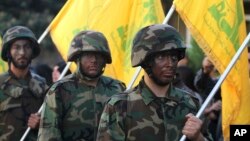The U.S. State Department announced Tuesday that it is adding several top Hamas and Hezbollah operatives to its terrorism list. The timing of the announcement - just days before Congress is likely to vote on the recently struck nuclear deal with Iran - appears to be a signal from the Obama administration that it will intensify efforts to counter Tehran-backed militancy in the Middle East, say analysts.
Congressional and overseas critics of the deal - especially in Israel and the Gulf - have warned that Iranian allies such as Hamas and the radical Lebanese Shia movement Hezbollah will benefit from the unfreezing of Iranian assets held abroad.
Three of the operatives being added to the U.S. Specially Designated Global Terrorists list are members of the Palestinian Hamas group. Another, Samir Kuntar, is now a senior Hezbollah operative who participated in the notorious 1979 Nahariya terror attack in which five Israelis, including a four-year-old girl, were killed. He is believed now to be overseeing Hezbollah operations in the Syrian part of the Golan Heights and is suspected of having directed a series of recent attacks on Israeli soldiers in the area.
Senior leaders
According to State Department officials, Kuntar has been “building up Hezbollah’s terrorist infrastructure in the Golan Heights” with the assistance of Iran and the Assad regime in Damascus. In November 2008, Syrian President Bashar al-Assad presented Kuntar with a Syrian medal and in early 2009 he was honored by then-Iranian president Mahmoud Ahmadinejad.
The Hamas members being designated - Yahya Sinwar, Rawhi Mushtaha, and Mohammed Deif - are all senior leaders. Mushtaha is a luminary in the political branch of Hamas and is a founding member of the group’s military wing, al-Qassam Brigades. The designation of the 50-year-old Deif has especially caught the eye of analysts. He has been Israel’s 'most wanted’ man for the last 20 years for his alleged involvement in multiple abductions of Israeli soldiers and for overseeing suicide attacks on Israel. The Israelis said he was killed along with his wife and two children in a targeted airstrike in August 2014, but Hamas denied he had also died in the raid.
“This seems to be a confirmation that Deif is alive,” said Jonathan Schanzer, chief of research at the Foundation for Defense of Democracies, a Washington-based think tank. “He is reportedly wheelchair bound and limited by injury, but it is significant because he is a crucial link between Hamas' Qassam Brigades and Iran.”
Sending a message
Being placed on the terrorism list means that all property subject to U.S. jurisdiction in which the individuals have any interest is blocked and Americans are prohibited from engaging in transactions with them. In practical terms it may have no immediate effect - most people designated as terrorists by Washington don’t have property subject to U.S. jurisdiction - but it signals the likelihood of targeted U.S. intelligence attention.
“Iran is the reason why all three of these individuals were designated,” Schanzer says. He interprets the designations as a bid to address the problem of Iran-sponsored terrorism as the signing looms of the controversial nuclear deal struck between Iran and the permanent members of the U.N. Security Council and Germany, plus the European Union.
The deal limits Iran’s nuclear program in return for the unfreezing of Iranian assets overseas and a gradual lifting of crippling economic sanctions. In the U.S., it has come under fierce criticism from mainly Republican lawmakers.
Israel’s government and the Gulf’s rulers have also chafed at the deal and last week Saudi King Salman held talks in Washington with President Barack Obama. Israeli Prime Minister Benjamin Netanyahu has argued publicly that money from sanctions relief and the unfreezing of Iranian assets will be bound to be shared with allies Hamas and Hezbollah and other “terror proxies” such as Palestinian Islamic Jihad.
Assuaging Israeli, Saudi concerns
Schanzer predicts in the weeks and months ahead we will see more terror designations of Hezbollah and Hamas operatives as a way to try to assuage Israeli and Saudi concerns over the deal.
“They will not actually do much to stop the flow of funds to Iran's proxies. But the White House will use them to signal to the more than half of the American legislators who disapproved of the deal that it is on the offensive against Iran's proxies,” Schanzer says. “The designations will also serve as an olive branch to Israel.”
The Obama administration has argued that although the deal is not perfect, it is the only realistic way of preventing Iran from developing nuclear weapons. President Barack Obama has maintained that those who want to tear up the agreement would be luring the United States into another Middle East war. “Let’s not mince words, the choice we face is ultimately between diplomacy and some form of war. Maybe not tomorrow, maybe not three months from now, but soon,” Obama said in a speech in August.
On Wednesday, Hillary Clinton, the former secretary of state and the frontrunner to win the Democratic Party’s nomination for the 2016 presidential election, offered a robust endorsement of the nuclear deal, saying the U.S. faces a choice to either “move forward on a path to diplomacy or turn down a more dangerous path leading to a far less certain and riskier future.”
But Clinton qualified her support for the agreement by arguing a broader strategy was also needed to address Tehran’s “bad behavior in the region.”




